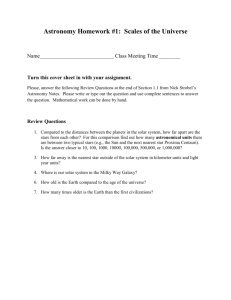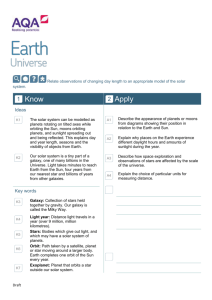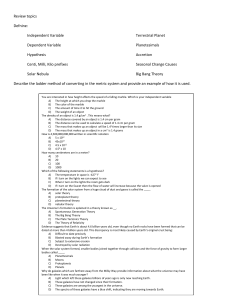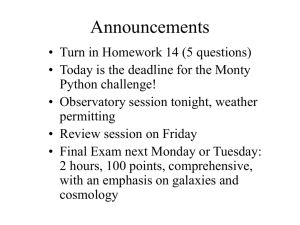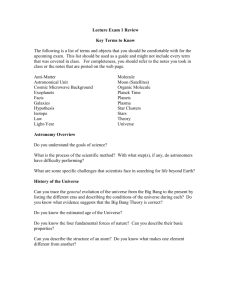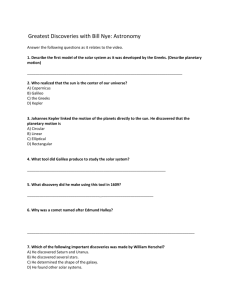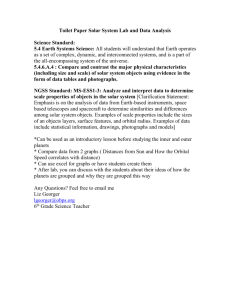Astronomy - Marshall Public Schools
advertisement
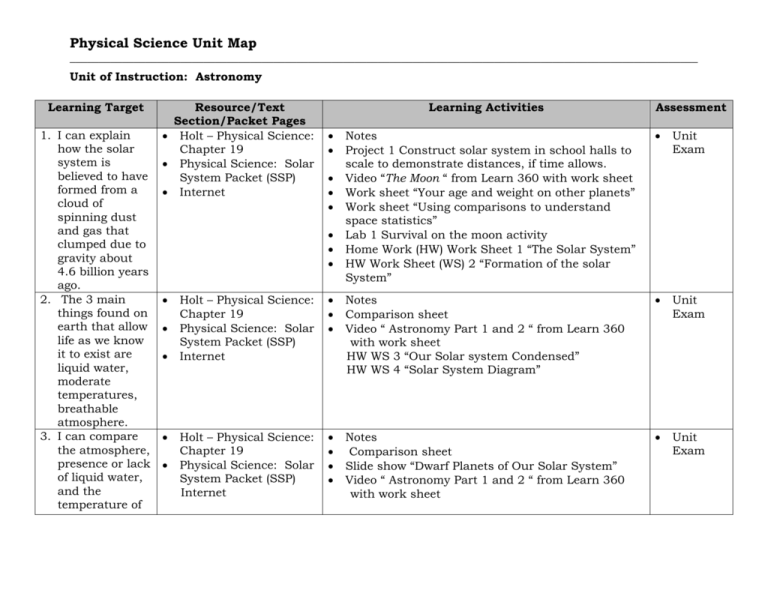
Physical Science Unit Map ____________________________________________________________________________________________________________ Unit of Instruction: Astronomy Learning Target 1. I can explain how the solar system is believed to have formed from a cloud of spinning dust and gas that clumped due to gravity about 4.6 billion years ago. 2. The 3 main things found on earth that allow life as we know it to exist are liquid water, moderate temperatures, breathable atmosphere. 3. I can compare the atmosphere, presence or lack of liquid water, and the temperature of Resource/Text Section/Packet Pages Holt – Physical Science: Chapter 19 Physical Science: Solar System Packet (SSP) Internet Learning Activities Assessment Notes Project 1 Construct solar system in school halls to scale to demonstrate distances, if time allows. Video “The Moon “ from Learn 360 with work sheet Work sheet “Your age and weight on other planets” Work sheet “Using comparisons to understand space statistics” Lab 1 Survival on the moon activity Home Work (HW) Work Sheet 1 “The Solar System” HW Work Sheet (WS) 2 “Formation of the solar System” Unit Exam Holt – Physical Science: Chapter 19 Physical Science: Solar System Packet (SSP) Internet Notes Comparison sheet Video “ Astronomy Part 1 and 2 “ from Learn 360 with work sheet HW WS 3 “Our Solar system Condensed” HW WS 4 “Solar System Diagram” Unit Exam Holt – Physical Science: Chapter 19 Physical Science: Solar System Packet (SSP) Internet Notes Comparison sheet Slide show “Dwarf Planets of Our Solar System” Video “ Astronomy Part 1 and 2 “ from Learn 360 with work sheet Unit Exam Physical Science Unit Map ____________________________________________________________________________________________________________ earth with other planets and moons in our solar system and show ours is the only body in the solar system, we now know of, that has liquid water, moderate temperatures and breathable atmosphere . 4. I can explain how the Doppler Red Shift shows bodies in the universe are moving apart which supports the Big Band Theory. 5. I can explain how comic back ground radiation of about 2 degrees Kelvin can be used to understand the universe was once very hot HW WS 3 “Our Solar System Condensed” HW WS 5 “Comets and Asteroids Venn Diagram” HW WS 6 “Using Comparisons to Understand Statistics” HW WS 7 “Exercise in Space” Holt – Physical Science: Chapter 20 Physical Science: Universe Packet (UP) Holt – Physical Science: Chapter 20 Physical Science: Universe Packet (UP) Notes Concept review: Study guide Concept review: Skills work sheet Video “Beyond the Big Bang” from Learn 360 with work sheet HW WS 8 “Origin of the Universe” HW WS 9 “Concept Review: Red Shift Blue Shift” Unit Exam Notes Concept review: Study guide Video “Beyond the Big Bang” from Learn 360 with work sheet HW WS 10 “Origin of the Universe” Unit Exam Physical Science Unit Map ____________________________________________________________________________________________________________ but has cooled down with time. 6. I can explain the Big Band Theory says that the universe was once an atom sized structure that exploded and yielded everything in the universe. 7. I can explain how hydrogen was pulled together due to gravity and eventually formed stars and galaxies. Holt – Physical Science: Chapter 20 Physical Science: Universe Packet (UP) Holt – Physical Science: Chapter 20 Physical Science: Universe Packet (UP) Notes Concept review: Study guide Video “Beyond the Big Bang” from Learn 360 with work sheet HW WS 10 “Origin of the Universe” Unit Exam Notes Handouts Video “Beyond the Big Bang” from Learn 360 with work sheet Video “Stars of the Universe” from Learn 360 with work sheet Power Point on Galaxies, black holes, quasars, dark matter Power Point on Exoplanets Video “The Sun and Stars” from Learn 360 with work sheet (Shown and discussed if there is time.) HW WS 11 “The Milky Way and Other Galaxies” HW WS 12 “The Life and Death of Stars” Unit Exam Physical Science Unit Map ____________________________________________________________________________________________________________ Key Words for Solar System Nebular theory Terrestrial Jovian Elliptic meteor meteoroid meteorite geocentric Heliocentric Impact Theory asteroid comet Doppler Effect Red shift Blue shift Kepler’s Laws of Planetary Motion Kuiper Belt Irregular galaxy Elliptical galaxy Black hole Neutron star Extra solar planets (Exoplanets) Red shift Quasars Dark matter pulsars Key Words for Universe Big Bang Theory Spiral galaxy Main sequence star Dwarf stars Doppler Effect Oort Cloud Blue shift Assessment Plan Notes Target Target Target Target Target Target Target 1 2 3 4 5 6 7 X X X X X X X 1 X Homework Assignments 2 3 4 5 6 7 X X X X X X X 8 X 9 10 11 12 X X X X X Lab 1 X Lab 2 Lab 3 Project X Unit Exam X X X X X X X Physical Science Unit Map ____________________________________________________________________________________________________________
